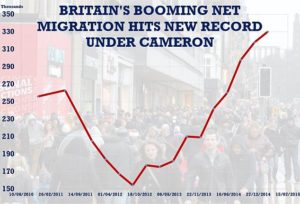With a very high level of economic migration from low-pay economies in Central and Eastern Europe, it’s no surprise to have witnessed over a decade of low wages in the UK.
Last week the Office for National Statistics (ONS) revealed the latest migration figures for the United Kingdom. 
Hailed in the media as a big fall, net immigration for the year ending March 2017 was still very high at 246,000.
This influx is a similar number to the population of Medway but does represent a reduction when compared with 2015, when net immigration was a staggering 333,000 – roughly equal to all the people of Wearside arriving in one year.
Of course, any decrease is welcome.
However, if Brexit is discouraging economic migration into the UK, it’s a change that has everything to do with the good sense of the British people to vote leave, and not any concerted effort by the government to limit the tide of workers from the continent, who seek our (relatively) high wages, in-work benefits, and free healthcare.
But predictably, groups such as the CBI expressed concern at the loss of “vital skills” following the publication of the latest report.
In reality the aim of free movement of labour was and is enrichment rather than economics – after all, only ‘diverse communities’ have value, right?
The journey of economic integration that the EU navigates is ultimately heading for a political destination: a borderless, multicultural, faithless, and increasingly genderless, ultra-PC state.
Talk is cheap labour
After Labour came to power in 1997, the subsequent increase in net migration was as deliberate as it was cynical.
In 2004, ten further European nations joined the EU, and the government effectively gave each of their citizens a British passport, thereby opening the UK’s job market to millions more.
Thus, today we are facing the consequences of two decades of six-figure inflows annually.
Former Tory PM David Cameron’s pledge in 2015 to cut net migration to below 100,000 was never likely with Britain in the EU, or indeed while we have a Conservative government.
With a ready supply of workers from low-pay economies in central and Eastern Europe, it is no surprise to have witnessed over a decade of stagnant earnings in the UK.
Salaries are still below pre-financial crisis levels some ten years later.
The typical hard-working white British family does not feel the economic advantages of mass-migration and unrestrained globalism.
What is felt is the very real lack of affordable housing and the changing character of our communities in less than a generation.
Indeed, how was it possible that during the Second Industrial Revolution, our economic engine was maintained when just 1.2% of the population of England & Wales was born abroad (1891)?
Even if we add the Irish-born population to this number (but keep in mind all of Ireland was then part of the UK), the figure will be still less than 2.6%.
Today, recent ONS statistics show that around one in seven people living in Britain were born overseas.
In the town of Boston, for example, that figure rises to more than one in four.
Of course, even those numbers hide the legacy of post-war third-world migration and the number of people here illegally.
Therefore, we can conclude that this new age of open-border immigration and economic migration is pushing us forwards into an unparalleled era of wage stagnation and sluggish economic growth.
The ONS is projecting that immigration could be over a quarter-of-a-million each year for the foreseeable future.
But there is an alternative.
It doesn’t have to be this way.
Join us to help make your voice heard!
Support the British National Party today.





